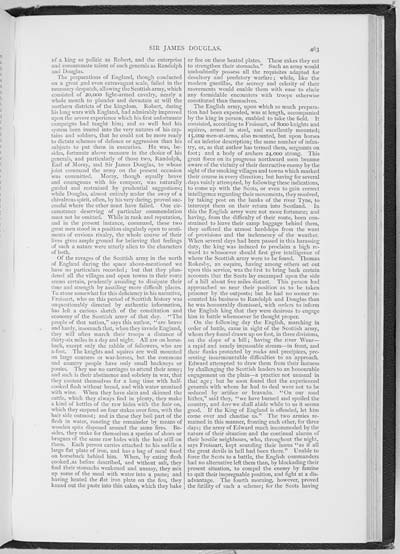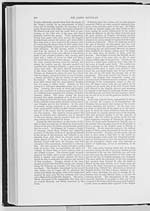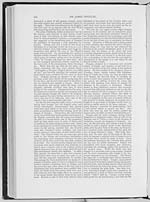463
of a king so politic as Robert, and the enterprise
and consummate talent of such generals as Randolph
and Douglas.
The preparations of England, though conducted
on a great and even extravagant scale, failed in the
necessary despatch, allowing the Scottish army, which
consisted of 20,000 light-armed cavalry, nearly a
whole month to plunder and devastate at will the
northern districts of the kingdom. Robert, during
his long wars with England, had admirably improved
upon the severe experience which his first unfortunate
campaigns had taught him; and so well had his
system been inured into the very natures of his cap-
tains and soldiers, that he could not be more ready
to dictate schemes of defence or aggression than his
subjects to put them in execution. He was, be-
sides, fortunate above measure in the choice of his
generals, and particularly of those two, Randolph,
Earl of Moray, and Sir James Douglas, to whose
joint command the army on the present occasion
was committed. Moray, though equally brave
and courageous with his compeer, was naturally
guided and restrained by prudential suggestions;
while Douglas, almost entirely under the sway of a
chivalrous spirit, often, by his very daring, proved suc-
cessful where the other must have failed. One cir-
cumstance deserving of particular commendation
must not be omitted. While in rank and reputation,
and in the present instance, command, these two
great men stood in a position singularly open to senti-
ments of envious rivalry, the whole course of their
lives gives ample ground for believing that feelings
of such a nature were utterly alien to the characters
of both.
Of the ravages of the Scottish army in the north
of England during the space above-mentioned we
have no particulars recorded; but that they plun-
dered all the villages and open towns in their route
seems certain, prudently avoiding to dissipate their
time and strength by assailing more difficult places.
To atone somewhat for this deficiency in his narrative,
Froissart, who on this period of Scottish history was
unquestionably directed by authentic information,
has left a curious sketch of the constitution and
economy of the Scottish army of that day. "The
people of that nation," says this author, "are brave
and hardy, insomuch that, when they invade England,
they will often march their troops a distance of
thirty-six miles in a day and night. All are on horse-
back, except only the rabble of followers, who are
a-foot. The knights and squires are well mounted
on large coursers or war-horses, but the commons
and country people have only small hackneys or
ponies. They use no carriages to attend their army;
and such is their abstinence and sobriety in war, that
they content themselves for a long time with half-
cooked flesh without bread, and with water unmixed
with wine. When they have slain and skinned the
cattle, which they always find in plenty, they make
a kind of kettles of the raw hides with the hair on,
which they suspend on four stakes over fires, with the
hair side outmost; and in these they boil part of the
flesh in water, roasting the remainder by means of
wooden spits disposed around the same fires. Be-
sides, they make for themselves a species of shoes or
brogues of the same raw hides with the hair still on
them. Each person carries attached to his saddle a
large flat plate of iron, and has a bag of meal fixed
on horseback behind him. When, by eating flesh
cooked,as before described, and without salt, they
find their stomachs weakened and uneasy, they mix
up some of the meal with water into a paste; and
having heated the flat iron plate on the fire, they
knead out the paste into thin cakes, which they bake
or fire on these heated plates. These cakes they eat
to strengthen their stomachs." Such an army would
undoubtedly possess all the requisites adapted for
desultory and predatory warfare; while, like the
modern guerillas, the secrecy and celerity of their
movements would enable them with ease to elude
any formidable encounters with troops otherwise
constituted than themselves.
The English army, upon which so much prepara-
tion had been expended, was at length, accompanied
by the king in person, enabled to take the field. It
consisted, according to Froissart, of 8000 knights and
squires, armed in steel, and excellently mounted;
15,000 men-at-arms, also mounted, but upon horses
of an inferior description; the same number of infan-
try, or, as that author has termed them, sergeants on
foot; and a body of archers 24,000 strong. This
great force on its progresss northward soon became
aware of the vicinity of their destructive enemy by the
sight of the smoking villages and towns which marked
their course in every direction; but having for several
days vainly attempted, by following these indications,
to come up with the Scots, or even to gain correct
intelligence regarding their movements, they resolved,
by taking post on the banks of the river Tyne, to
intercept them on their return into Scotland. In
this the English army were not more fortunate; and
having, from the difficulty of their route, been con-
strained to leave their camp baggage behind them,
they suffered the utmost hardships from the want
of provisions and the inclemency of the weather.
When several days had been passed in this harassing
duty, the king was induced to proclaim a high re-
ward to whosoever should first give intelligence of
where the Scottish army were to be found. Thomas
Rokesby, an esquire, having among others set out
upon this service, was the first to bring back certain
accounts that the Scots lay encamped upon the side
of a hill about five miles distant. This person had
approached so near their position as to be taken
prisoner by the outposts; but he had no sooner re-
counted his business to Randolph and Douglas than
he was honourably dismissed, with orders to inform
the English king that they were desirous to engage
him in battle whensoever he thought proper.
On the following day the English, marching in
order of battle, came in sight of the Scottish army,
whom they found drawn up on foot, in three divisions,
on the slope of a hill; having the river Wear�
a rapid and nearly impassable stream�in front, and
their flanks protected by rocks and precipices, pre-
senting insurmountable difficulties to an approach.
Edward attempted to draw them from their fastness
by challenging the Scottish leaders to an honourable
engagement on the plain�a practice not unusual in
that age; but he soon found that the experienced
generals with whom he had to deal were not to be
seduced by artifice or bravado. "On our road
hither," said they, "we have burned and spoiled the
country, and here we shall abide while to us it seems
good. If the King of England is offended, let him
come over and chastise us." The two armies re-
mained in this manner, fronting each other, for three
days; the army of Edward much incommoded by the
nature of their situation and the continual alarms of
their hostile neighbours, who, throughout the night,
says Froissart, kept sounding their horns "as if all
the great devils in hell had been there." Unable to
force the Scots to a battle, the English commanders
had no alternative left them than, by blockading their
present situation, to compel the enemy by famine
to quit their impregnable position, and fight at a dis-
advantage. The fourth morning, however, proved
the futility of such a scheme; for the Scots having

![]() Universal Viewer |
Universal Viewer | ![]() Mirador |
Large image | Transcription
Mirador |
Large image | Transcription
![]()

